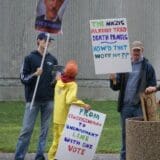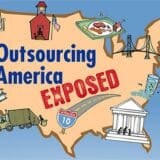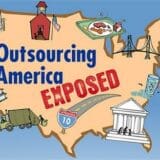LATEST NEWS


(This article was reported in partnership with the Investigative Fund of the Nation Institute. It first appeared on The Nation’s website and is republished with permission.)
The call from the temp agency comes in late October. I’ve passed the drug test, cleared the background check, sat down for a quick interview—“Can you lift fifty-pound boxes?”—and completed a worksheet of basic math problems. Now there’s a job. A warehouse just outside the city of Ontario, about forty miles east of Los Angeles, needs more bodies to meet the holiday crush.
They do work for Walmart, Best Buy, “all sorts of big companies,” says the female voice on the line. Orientation starts at 8:15 am; pay is $9 an hour. “Make sure you’re early.” Before hanging up she repeats the order. “Be early.”
On an overcast Tuesday, I pull into the parking lot,
» Read more about: Eyewitness: Working Inside an Inland Empire Warehouse »


Bursting out of ourselves,
rush of coat and elbow,
we rode over, over
Jimmy Damour, standing guard in the dawn —
the door yanked from its socket.
We rode as though on horseback
in the direction of our wanting.
They say you lay in a sleep of bronze
on the white linoleum,
while we shopped for TVs.
You a stone in the current of us.
Like water, indifferent, serpentine,
we carved the earth,
with our urgent business.
They say you shielded a pregnant woman
with your body,
that beneath the weight of us
she heard the grinding of her own teeth.
I’d like to say that because of you, Jimmy,
we make do with less.
It would suit my miserly heart
to cut, extract, leave out, whittle
down to the essential quart
of milk and sack of beans
to sit hearthside with this set of hands,


For a list of Black Friday actions planned nearest you, go to https://blackfridayprotests.org/
» Read more about: Walmart Braces for Black Friday Protests Today »


» Read more about: Happy Thanksgiving — Eat (Not Shop) Till You Drop! »
On the face of it, a report that Walmart has yet to cough up the $7,000 fine it owes the government over an infamous 2008 Black Friday tragedy should be shocking. In fact, Walmart is not simply behind in its payment, it is actively fighting the fine. The incident in question took place when Jdimytai Damour, a store employee at a Long Island Walmart, died during a shopper stampede – a literal “doorbuster” – during which hundreds of people poured through the store’s unhinged glass doors before the dawn of the morning after Thanksgiving.
“Should be shocking,” because somehow we’ve become so used to hearing about the retail giant’s outlandish and dangerous obsession with profits that such news doesn’t surprise many people. Writing in the Huffington Post, Dave Jamieson noted:
For a company with sales of $466 billion last fiscal year, the $7,000 fine from the Occupational Safety and Health Administration represents little more than a single store’s rounding error.


This Friday, the busiest shopping day of the year, tens of millions of Americans will travel to Walmart stores to look for holiday discounts on computers, toys and cell phones as well as to buy groceries and basic household items. But at more than 1,500 of Walmart’s 4,000 stores, shoppers will be greeted by Walmart employees handing out leaflets and holding picket signs — “Walmart: Stop Bullying, Stop Firing, Start Paying” and “We’re Drawing a Line at the Poverty Line: $25,000/year” — protesting the company’s abusive labor practices, including poverty-level wages, stingy benefits and irregular work schedules that make it impossible for their families to make ends meet.
The Black Friday rallies and demonstrations represent a dramatic escalation of the growing protest movement among employees of America’s largest private employer. But they also represent the vanguard of a sharp challenge to the nation’s widening economic divide and the declining standard of living among the majority of Americans.
Happy Union Thanksgiving!
The Meal of the Year is here! This is family time, and in the labor movement we know all about the importance of family. The crazy fun of Black Friday follows, so don’t forget to buy union made when you can. And while some stores want to open on Thanksgiving Day this year, we say family, friends and those we care about are worth more than a few extra hours of shopping.
We’ve put together a Thanksgiving shopping list for a great union-made spread. And we realize it can sometimes be difficult to find union made for everything on your list, so another great way to go union is to patronize union grocery stores. So enjoy the day! And we’ve got one more recipe — for stout cake — that you’re going to want to add to the table this year in our Product Spotlight below.


A recent Los Angeles Times editorial succinctly spelled out the simple truth about a potentially major labor case now before the U.S. Supreme Court. In Unite Here Local 355 v. Mulhall, a hospitality union is seeking to overturn a lower court decision favoring a supposedly disgruntled worker whose case just happened to be taken up by the National Right to Work Legal Defense Foundation.
The case’s backstory is a somewhat complicated tale involving a Florida union local’s attempt to organize workers employed by the operator of a casino and race track. That operator, Mardis Gras Gaming, accepted a “neutrality agreement” with UNITE HERE, in order to give the union access to Mardis Gras’ workers without management objections. The arrangement also allowed for what’s called a card-check election, which is often used to simplify union elections at businesses.
But one Mardis Gras employee,
» Read more about: Supreme Court Considers an Important Labor Case »


Having failed to defeat the Affordable Care Act in Congress, to beat it back in the last election, to repeal it despite more than 80 votes in the House, to stop it in the federal courts, to get enough votes in the Supreme Court to overrule it and to gut it with outright extortion (closing the government and threatening to default on the nation’s debts unless it was repealed), Republicans are now down to their last ploy.
They are hell-bent on destroying the Affordable Care Act in Americans’ minds.
A document circulating among House Republicans (reported by the New York Times) instructs them to repeat the following themes and stories continuously: “Because of Obamacare, I Lost My Insurance.” “Obamacare Increases Health Care Costs.” “The Exchanges May Not Be Secure, Putting Personal Information at Risk.”
Every Republican in Washington has been programmed to use the word “disaster” whenever mentioning the Act,
» Read more about: Obamacare Smears Can’t Hide Three Major Truths »


So an Ohio Walmart started a food drive among its employees to help its lower income workers get a decent Thanksgiving. “Please Donate Food Items Here so Associates in Need Can Enjoy Thanksgiving Dinner,” reads a sign in the clerk’s break room. Someone snapped a photo on their cell phone, put it on-line and it went viral. The image underscores what Walmart itself knows: One million of its employees earn less than $25,000 dollars a year – impossible to live on in Ohio, much less Los Angeles, where an average apartment rents for $1,480 a month.
But did you know that L.A. County also leads the nation in “food insecurity”? That’s the current euphemism that means people are likely to go hungry. A national network of food banks estimated that 650,000 children in our county risk going without enough to eat. These are kids who live with parents or guardians who cannot afford a balanced meal or who skip dinner themselves to feed their children.


The twin harbors at the Ports of Los Angeles and Long Beach handle 40 percent of the nation’s imported cargo and generate some of the best middle-class jobs in Southern California. And yet it would be a serious mistake to believe that all who work in the transportation of goods share in the bounty provided by port traffic.
Writing in today’s Los Angeles Times, Congresswoman Janice Hahn notes that “many of the truck drivers who serve the ports find themselves stuck at the bottom of the economic ladder because of the way their employers classify and exploit them.”
The drivers Hahn speaks of are mostly immigrant workers employed by companies who label them as “independent contracts” — a ploy that enables the companies to deduct their own trucking-related business expenses from their drivers’ wages. Hahn recalls speaking to drivers who have told her that, under this system,
» Read more about: Janice Hahn: Port Drivers Must Be Treated Fairly »


A recent Los Angeles Times editorial succinctly spelled out the simple truth about a potentially major labor case now before the U.S. Supreme Court. In Unite Here Local 355 v. Mulhall, a hospitality union is seeking to overturn a lower court decision favoring a supposedly disgruntled worker whose case just happened to be taken up by the National Right to Work Legal Defense Foundation.
The case’s backstory is a somewhat complicated tale involving a Florida union local’s attempt to organize workers employed by the operator of a casino and race track. That operator, Mardis Gras Gaming, accepted a “neutrality agreement” with UNITE HERE, in order to give the union access to Mardis Gras’ workers without management objections. The arrangement also allowed for what’s called a card-check election, which is often used to simplify union elections at businesses.
But one Mardis Gras employee,
» Read more about: Supreme Court Considers an Important Labor Case »
This Thanksgiving, Walmart decided to show its workers that it’s concerned for their families. First, the retailer required that employees work not only on Black Friday, but also Thanksgiving night this year as, once more, it plans to start its Black Friday sale Thursday evening. Second, Walmart knew that because its workers make such low wages and are often on food stamps, the company decided to collect canned food for them.
Yes, the food box scandal that you’ve read in the news over the past few days is true. Walmart workers have been scraping together food donations for – themselves! Even The Colbert Report covered the disgrace. All of this comes on the heels of Walmart workers having to strike due to retaliation for speaking out against low pay ($8.81 an hour!), insufficient hours and unaffordable health care.
So,
» Read more about: How to Support Walmart Workers This Holiday Season »


It really is true what they say – if you’re old enough, you’ll remember where you were when you heard President Kennedy was dead. I was onstage rehearsing a fifth-grade play when a teacher (a jovial Texan who seemed to know everything about the history of Dr. Pepper soda) came into the auditorium with the news. He and my own teacher seemed more fascinated than saddened about what had happened in Dallas, and we kids were just happy to suddenly be sent home early. Outside, yellow maple leaves covered the sidewalks, the fall air was tinged with a slight chill and, as it was a Friday, with the smell of burning papers from our school’s incinerator.
Today, of course, is the 50th anniversary of the assassination and this month has been all about JFK, especially on television, where Kennedy appears to have been rehabilitated as, once more, the man who was on the verge of changing the world.
» Read more about: If JFK Had Lived – He’d Be Very Old Today »


Twenty-seven port truck drivers walked into the Rancho Dominguez offices of Total Transportation Services, Inc. (TTSI) Thursday and presented their employer with a petition. Their demand was simple: to be properly recognized as employees. TTSI is one of the largest port trucking companies in the twin ports of Los Angeles and Long Beach. TTSI’s business model – like the vast majority of port trucking companies in the country – relies on misclassifying its drivers as independent contractors.
When companies like TTSI misclassify their employees, they not only deprive the public of much-needed revenue by avoiding taxes, they also deprive workers of hard-earned wages by deducting business expenses like lease payments and fuel from drivers’ paychecks.
As TTSI driver Jose Rosales states, “Some weeks we aren’t even breaking even. How can I build a future for my family this way?”
Rosales and his fellow TTSI drivers who delivered yesterday’s petition are also seeking recourse through the California Division of Labor Standards Enforcement (DLSE),
» Read more about: TTSI’s Port Drivers Demand to Be Treated as Employees »


As Gary Cohn and Bill Raden point out in a recent Frying Pan News piece, it’s become the pastime of conservatives to skew debates over public employee pensions by singling out the comparatively high retirement benefits of “top-tier city and county executives,” while ignoring the typical pensions earned by the vast majority of government workers. This ploy is also used, naturally, in propaganda decrying the salaries of public sector employees while they are still actively working for states and cities.
The Center for Media and Democracy’s new project, Outsourcing America Exposed, has discovered that there is, in fact, a breed of “government worker” whose members receive sky-high, taxpayer-funded salaries. They are not teachers or librarians, however, but “CEOs whose corporations make billions by taking control of public services.”
Says CMD executive director Lisa Graves: “Taxpayers are being duped by corporate CEOs and Wall Street banks that are siphoning money out of our communities for huge salaries and bonus packages.”
Graves is referring to the gold-plated trough known as privatization,
» Read more about: How Public Taxes Became a CEO’s Personal Income »


It really is true what they say – if you’re old enough, you’ll remember where you were when you heard President Kennedy was dead. I was onstage rehearsing a fifth-grade play when a teacher (a jovial Texan who seemed to know everything about the history of Dr. Pepper soda) came into the auditorium with the news. He and my own teacher seemed more fascinated than saddened about what had happened in Dallas, and we kids were just happy to suddenly be sent home early. Outside, yellow maple leaves covered the sidewalks, the fall air was tinged with a slight chill and, as it was a Friday, with the smell of burning papers from our school’s incinerator.
Today, of course, is the 50th anniversary of the assassination and this month has been all about JFK, especially on television, where Kennedy appears to have been rehabilitated as, once more, the man who was on the verge of changing the world.
» Read more about: If JFK Had Lived – He’d Be Very Old Today »


(for Sonia Nieto)
In Brooklyn, the mice were crazy
with courage, bony gray pickpockets
snatching crumbs from plates
at the table. The roaches
panicked in spirals on the floor,
or weaved down walls
for the sanctuary of cracked paint.
No heat, so the oven door drooped open
like an immigrant’s surprise.
Sonia’s mother was mute in English,
mouth chapped and coughing
without words to yell for heat.
But the neighbors spoke of Borofels:
Tell Borofels, and mice shrivel in traps,
roaches kick in poisoned heaps,
steam pipes bang so loud
that windows open in winter.
Sonia and her mother sailed
on a subway train rocking like a ship
desperate for light, then rose
into an untranslated territory
of Brooklyn. So Sonia translated:
“Where is Borofels?”
No one knew;


As Gary Cohn and Bill Raden point out in a recent Frying Pan News piece, it’s become the pastime of conservatives to skew debates over public employee pensions by singling out the comparatively high retirement benefits of “top-tier city and county executives,” while ignoring the typical pensions earned by the vast majority of government workers. This ploy is also used, naturally, in propaganda decrying the salaries of public sector employees while they are still actively working for states and cities.
The Center for Media and Democracy’s new project, Outsourcing America Exposed, has discovered that there is, in fact, a breed of “government worker” whose members receive sky-high, taxpayer-funded salaries. They are not teachers or librarians, however, but “CEOs whose corporations make billions by taking control of public services.”
Says CMD executive director Lisa Graves: “Taxpayers are being duped by corporate CEOs and Wall Street banks that are siphoning money out of our communities for huge salaries and bonus packages.”
Graves is referring to the gold-plated trough known as privatization,
» Read more about: How Public Taxes Became a CEO’s Personal Income »


Walmart’s 1.3 million workers won a big victory Monday when the National Labor Relations Board ruled that the retail giant had broken the law by firing and harassing employees who spoke out—and in some cases went on strike—to protest the company’s poverty pay and abusive labor practices.
The federal agency will prosecute Walmart’s illegal firings and disciplinary actions involving more than 117 workers, including those who went on strike last June as part of a growing movement of company employees. The ruling is likely to accelerate the burgeoning protest movement among Walmart employees, upset with low pay, stingy benefits, arbitrary work schedules and part-time jobs.
Over the past year, protests against the world’s largest private employer have escalated, led by OUR Walmart, a nationwide network of Walmart workers. Last fall, the group announced that it would hold rallies outside Walmart stores in dozens of cities on the day after Thanksgiving—the busiest shopping day of the year,
» Read more about: NLRB Sides With Walmart Workers in Major Ruling »